Evaluation of character association between cured leaf yield and attributing characteristic in F3 generation of FCV (Flue Cured Virginia) Tobacco (Nicotiana tabaccum L.)
Bạn đang xem bản rút gọn của tài liệu. Xem và tải ngay bản đầy đủ của tài liệu tại đây (219.03 KB, 6 trang )
Int.J.Curr.Microbiol.App.Sci (2018) 7(10): 3775-3780
International Journal of Current Microbiology and Applied Sciences
ISSN: 2319-7706 Volume 7 Number 10 (2018)
Journal homepage:
Original Research Article
/>
Evaluation of character association between cured leaf yield and
attributing characteristic in F3 generation of FCV (Flue Cured Virginia)
Tobacco (Nicotiana tabaccum L.)
K. N. Shubha, H. D. Mohan Kumar* and G. Megha
Department of Genetics and Plant Breeding, College of Agriculture, Shivamogga
University of Agricultural and Horticultural Sciences, Shivamogga-577225, Karnataka, India
*Corresponding author
ABSTRACT
Keywords
Tobacco
(Nicotiana tabacum
L.), Flue Cured
Virginia
Article Info
Accepted:
24 September 2018
Available Online:
10 October 2018
The experiment was carried out at ZAHRS, UAHS, Shivamogga during
2016-2017 Kharif to study the character association and path analysis in
respect of cured leaf yield and its contributing traits in F3 generation of
FCV (Flue Cured Virginia) tobacco cross TB-70 x TB-102, The component
characters viz., green leaf yield, top grade equivalent, stem girth, number of
leaves per plant, leaf length, leaf area per plant, plant height and leaf
breadth exhibited significant positive correlation with each other and also
with cured leaf yield. Path analysis in F3 generation indicated maximum
positive direct effect of number of leaves per plant, top grade equivalent,
leaf breadth, leaf length and green leaf yield on cured leaf yield. In the
present investigation superior promising individual families were identified
in F3 generation. Therefore, for improving cured leaf yield selection may be
based on characters which have shown positive direct association with
cured leaf yield.
Introduction
Tobacco (Nicotiana tabacum L.) is one of the
world’s most widely cultivated non-food
commercial crop and is chosen by farmers in
more than 120 countries because of its
performance under widely varying climatic
and soil conditions. India is one of the top ten
countries cultivating tobacco (Nicotiana
species) for domestic and international market.
The major tobacco producing countries in the
world are China, U.S.A., Brazil, India, Turkey
and Bulgaria. In FCV tobacco cured leaf yield
is of economic importance which is a complex
trait influenced by many component character.
Hence it is necessary to understand the
magnitude and direction of association among
these related characters.
3775
Int.J.Curr.Microbiol.App.Sci (2018) 7(10): 3775-3780
Correlation studies provide an opportunity to
study the magnitude and direction of
association of yield with its direct and indirect
components and also among various
components. So to
identify the suitable
selection criteria for improving the yield,
correlation analysis is of great importance.
Thus helps for effectively measuring the
relative importance of causal factors which
helps to build an effective selection program.
The purpose of this study, therefore, is to
estimate phenotypic correlation between leaf
yield and yield attributing traits as well as the
direct and indirect effects of these component
traits on yield. To unravel these direct and
indirect effects of different characters on the
yield, path coefficient analysis is needed.
Correlation and path analysis thus help in
identifying suitable selection criteria for
improving the yield. Therefore, the present
study was undertaken to know the nature of
association among different yield attributing
characters and with cured leaf yield.
Materials and Methods
Experiment was conducted at ZAHRS, college
of agriculture, UAHS Shimogga during Kharif
2016. Experimental material comprised of 25
F3 families of the cross TB-70 X TB-102 with
their parents and 3 checks Thrupti, Kanchan
and Sahyadri. They were grown in
Randomised block design. Each plot consisted
of 10 lines each with 10 plants, with intra and
inter row distance of 90X60cm. Fifty plants
within each plots were selected for taking the
following observations, they are days to 50%
flowering, days to maturity, plant height (cm),
specific leaf weight(mg/cm2), stem girth
(mm), internodal distance (cm), number of
leaves per plant, leaf length (cm), leaf breadth
(cm), leaf area (cm2), green leaf yield (Kg/ha),
cured leaf yield (Kg/ha), top grade equivalent
(Kg/ha), reducing sugar (%) and nicotine
content (%).
Area =Length x Width x 0.6345.
To determine the degree of association of
characters with yield and also among the yield
components, the correlation coefficients were
calculated. Phenotypic coefficients
of
correlation between two characters were
determined by using variance and covariance
components as suggested by Al- Jibouri et al.
(1958). Path coefficient analysis was carried
out using the phenotypic correlation
coefficients to know the direct and indirect
effects of the yield components on yield
following the method suggested by Wright
(1921) and as illustrated by Dewey and Lu
(1959).
Results and Discussion
In this study Phenotypic correlation
coefficients between dry leaf and its
contributing characters for F3 generation of the
cross TB-70 X TB- 102 were calculated. The
overall phenotypic correlations among the
traits are presented in Table 1.
Study revealed that cured leaf yield of tobacco
was shown highly positive and significant
association with top grade equivalent followed
by green leaf yield, number of leaves per plant
, leaf length, leaf area and plant height. The
same findings were obtained by Hamid et al.,
(2011). Wenping et al. (2009) found also
positive and significant correlations of dry leaf
yield with leaf length and leaf number. In
contrary to this leaf breadth were shown low
but positive association with cured leaf yield.
The association between specific leaf weight,
nicotine content and days to 50% flowering
was shown negative association with cured
leaf yield. The association between cured leaf
yield with reducing sugar, days to maturity
and internodal distance was shown negative
and negligible (As shown in Table 1.)
3776
Int.J.Curr.Microbiol.App.Sci (2018) 7(10): 3775-3780
Table.1 Phenotypic Correlation for cured leaf yield F3 families of FCV tobacco:
DFF
X1
X2
X3
X4
X5
1
DM
0.8549
1
PH
**
SLW
SG
ID
NLP
LL
LB
LA
GLY
TGE
RS
NIC
CLY
-0.1799
-0.1585
-0.1710
-0.1029
-0.1300
-0.0277
-0.2324
-0.1105
-0.1403
-0.0601
-0.1995
-0.0731
0.0589
0.1519
-0.1123
-0.0005
-0.1920
-0.1104
-0.1160
-0.0637
0.1076
0.1072
0.2220
0.0477
-0.1148
-0.0616
1
-0.1667
0.5106**
0.1085
0.4242**
0.4626**
0.1629
0.4324**
0.4883**
0.4416**
0.2066
0.0704
0.4423**
1
-0.0622
-0.1414
-0.1820
-0.0802
-0.1058
-0.1621
-0.1709
-0.2180
-0.2846*
0.0463
-0.2169
1
-0.0473
0.8895**
0.8908**
0.3263*
0.8760**
0.9096**
0.8424**
0.0880
-0.0397
0.8430**
1
0.0410
-0.0479
-0.0986
-0.0192
-0.0152
-0.0612
-0.0035
-0.2203
-0.0612
**
X6
X7
1
X8
0.8867
1
X9
X10
**
0.2882
*
0.9317
**
0.0682
-0.1784
0.9103**
0.3107*
0.8942**
0.9430**
0.8975**
0.2001
-0.0470
0.8978**
1
0.5988**
0.2590*
0.3165*
0.2906*
0.1374
0.3177*
1
0.9096**
0.8889**
0.0188
-0.0730
0.8892**
1
0.9450
-0.0874
-0.1756
0.9451**
1
-0.1085
-0.1599
0.9999**
1
-0.0901
-0.1084
1
-0.1609
X11
0.9597
X13
X14
X15
X12
** Correlation is significant at the 0.01 level
**
0.9106
1
*Correlation is significant at the 0.05 level
X1-Days to 50% flowering
X6- Internodal distance(cm)
X2- Days to maturity
X7- Number of leaves per plant
X3- Plant heght (cm)
X8- Leaf length (cm)
X4- Specific Leaf weight(mg/cm2) X9- Leaf breadth (cm)
X5- Stem girth (mm)
X10 Leaf area per plant(cm2)
X11- Green Leaf yield (Kg/ha)
X12- Cured leaf yield (Kg/ha)
X13- Top Grade Equivalent (Kg/ha)
X14- Reducing sugar (%)
X15- Nicotine content(%)
3777
Int.J.Curr.Microbiol.App.Sci (2018) 7(10): 3775-3780
Table.2 Estimates of direct and indirect effects of yield components on cured leaf yield at phenotypic level in
F3 families derived from cross TB-70 × TB-102
X1
X2
X3
X4
X5
X6
X7
X8
X9
X10
X11
X13
X14
X15
rp value
X1
-0.0272
-0.0260
0.0031
0.0086
-0.0002
0.0059
0.0003
0.0032
0.0030
0.0019
-0.0013
-0.0012
0.0037
0.0006
-0.0468
X2
-0.0175
-0.0183
0.0023
0.0076
0.0003
0.0047
0.0006
0.0015
0.0023
0.0015
-0.0014
-0.0007
0.0021
0.0003
-0.0350
X3
0.0049
0.0054
-0.0430
-0.0132
-0.0273
0.0120
-0.0093
-0.0202
-0.0046
-0.0150
-0.0194
-0.0271
-0.0002
0.0050
0.5098**
X4
-0.0027
-0.0036
0.0027
0.0087
0.0020
-0.0001
0.0016
0.0015
-0.0017
0.0003
0.0009
0.0012
0.0005
-0.0016
-0.1831
X5
0.0001
-0.0001
0.0055
0.0020
0.0086
-0.0037
0.0037
0.0051
0.0027
0.0054
0.0051
0.0069
-0.0016
0.0000
0.6764**
X6
0.0095
0.0112
0.0122
0.0003
0.0190
0.0439
0.0211
0.0208
0.0091
0.0215
0.0242
0.0279
-0.0048
-0.0035
-0.6790**
X7
-0.0088
-0.0243
0.1579
0.1305
0.3131
-0.3517
0.7299
0.1857
-0.0094
0.4565
0.3172
0.3686
0.0096
-0.0280
0.5782**
X8
-0.0432
-0.0302
0.1708
0.0618
0.2142
-0.1729
0.0926
0.3641
0.1299
0.2451
0.1517
0.2372
-0.1046
-0.0614
0.5566**
X9
-0.0686
-0.0768
0.0658
-0.1180
0.1918
-0.1285
-0.0080
0.2208
0.6190
0.4162
0.0526
0.2085
-0.1479
0.1637
0.1488
X10
0.0742
0.0869
-0.3761
-0.0341
-0.6697
0.5269
-0.6737
-0.7250
-0.7243
-1.0772
-0.3956
-0.7551
0.2334
-0.0808
0.5441**
X11
0.0150
0.0250
0.1460
0.0346
0.1909
-0.1790
0.1410
0.1352
0.0276
0.1191
0.3244
0.2349
-0.0278
-0.0405
0.8646**
X13
0.0249
0.0222
0.3428
0.0772
0.4362
-0.3460
0.2750
0.3548
0.1834
0.3817
0.3943
0.5446
-0.0980
-0.0616
0.8544
X14
-0.0056
-0.0046
0.0002
0.0022
-0.0077
0.0045
0.0005
-0.0118
-0.0098
-0.0089
-0.0035
-0.0074
0.0411
0.0004
-0.0967
X15
0.0021
0.0016
0.0113
0.0181
0.0001
-0.0078
0.0037
0.0164
-0.0258
-0.0073
0.1220
0.0110
-0.0010
-0.0974
-0.2051
3778
Int.J.Curr.Microbiol.App.Sci (2018) 7(10): 3775-3780
Correlation coefficients (phenotypic) of
reducing sugar were non significant with
almost all the traits except leaf breadth and
specific leaf weight. Hence, there is no effect
of reducing sugars on yield and its related
traits but effect the taste quality of tobacco
leaves. Gopalakrishna and Rao (1980) also
reported no associations of alkaloid contents
with yield and its components among Natu
tobacco cultivars.
Path coefficient analysis was carried out to
partition the correlation coefficients in to
direct and indirect effects of component traits
on cured leaf yield in F3 families of the cross
TB-70 x TB-102 and results are presented in
Table. 2.
When the correlation between a dependent
character and an independent character is not
significant, the direction of selection for that
independent character has to be decided based
on the magnitude and direction of its direct
effect and also on the direction in which its
majority of indirect effects (of considerable
magnitude) are operating. While dealing with
a more complex character like yield, it
enables the breeders to identify the important
component traits of such a nature so that
differential emphasis can be laid on such
component characters for selection.
The correlations have to be significant and the
direct and indirect effects have to be of
substantial magnitude for direct selection of
the trait to improve the dependent character.
Internodal length, reducing sugar, specific
leaf weight and reducing sugar exhibited low
positive direct effect on cured leaf yield. Patel
(1989) also found positive direct effect of
reducing sugar with cured leaf yield. Leaf
area per plant exhibited maximum negative
direct effect. Whereas plant height,
chlorophyll content, Days to 50 per cent
flowering and days to maturity exhibited
minimum negative direct effect on cured leaf
yield. These results are on par with the
findings of Ramachandra (2014) who reported
the negative direct effect of plant height and
days to 50per cent flowering on cured leaf
yield. Correlation of these traits with cured
leaf yield are mainly due to indirect effect of
these character through other component
traits. So indirect selection for these traits
through such component trait will be
desirable for yield improvement.
The correlation study revealed the importance
of characters like green leaf yield, top grade
equivalent, stem girth, number of leaves per
plant, leaf length, leaf area per plant, plant
height and leaf breadth for increasing cured
leaf yield. Further, path coefficient analysis
revealed that number of leaves per plant, top
grade equivalent, leaf breadth, leaf length and
green leaf yield in that order, were major
characters having positive direct effects and
significant positive association with cured leaf
yield, indicating due weightage need to be
given to these characters in selection
programme for bringing out an improvement
in cured leaf yield of flue cured virginia
tobacco.
Maximum indirect effects for yield were
exhibited by leaf area per plant through
number of leaves per plant, leaf breadth, top
grade equivalent and leaf length. Direct effect
of this trait with cured leaf yield was highly
negative but the correlation was positive
significant. So indirect selection also should
be practised for this trait through number of
leaves per plant, leaf breadth, top grade
equivalent and leaf length while selecting
cured leaf yield. Information obtained by this
will helps in indirect selection for component
traits.
Moreover, leaf area per plant exerted
moderate to high positive indirect effect on
cured leaf yield and thereby, greater
importance should be given to indirect
selection for this trait through it’s attributing
traits for improving cured leaf yield.
3779
Int.J.Curr.Microbiol.App.Sci (2018) 7(10): 3775-3780
References
AL-Jibouri, H. A., Miller, P. A. and
Robinson, H. F., 1958, Genotypic and
environmental variances and covariances in an upland cotton cross of
interspecific origin. Agron. J., 50: 633636.
Dewey, D. R. and L U., K. N., 1959,
Correlation and path coefficient analysis
of components of crested wheat grass
seed production. Agron. J., 51: 515-518.
Gopalakrishna, C. V. S. S. V. and Rao, A .H.,
1980, Studies on some chemical quality
parameter of natu tobacco. J. Tob. Res.,
6(2): 94-97.
Hamid,
H.
M.,
Karimzadeh,
G.,
Darvishzadeh, R. and Sarrafi, A., 2011,
Correlation and sequential path analysis
of some agronomic traits in tobacco
(Nicotiana tabaccum L.) to improve dry
leaf yield.Aus. J. Crop Sci., 5(12):
1644-1648.
Patel, K. K., Patel, B. K. and Ghelani, L. M.,
1989, Chemical quality parameters for
evaluation of bidi tobacco. Tob. Res.,
15(1): 37-42
Ramachandra, R. K., Nagappa, B. H.,
Anjaneya, R. B. and Harishbabu, B. N.,
2014, Correlation and path analysis
studies on bidi tobacco (Nicotiana
tabacum L.). Indo-Am. J. Agric & Vet.
Sci., 2(3): 63-69.
Wenping, L. I., Zhu, L. and Zhao, S., 2009,
Correlation and path coefficient analysis
and euclidean distance clustering for
several characters in tobacco germplasm
resource. Chin. Tob. Sci., 30: 59-63.
Wright, S., 1921, Correlation and causation.
J. Agric. Res., 20: 557-585.
How to cite this article:
Shubha, K. N., H. D. Mohan Kumar and Megha, G. 2018. Evaluation of character association
between cured leaf yield and attributing characteristic in F3 generation of FCV (Flue Cured
Virginia) Tobacco (Nicotiana tabaccum L.). Int.J.Curr.Microbiol.App.Sci. 7(10): 3775-3780.
doi: />
3780
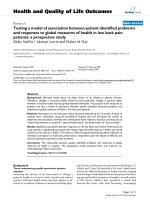
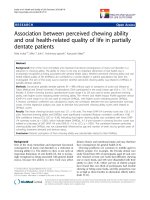

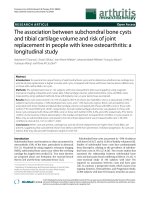

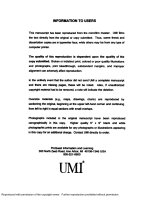
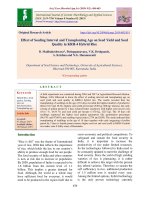
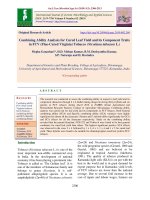
![Studies on correlation and path analysis for grain yield and quality components in foxtail millet [Setaria italica (L.) Beauv.]](https://media.store123doc.com/images/document/2020_01/09/medium_dyd1578574836.jpg)
